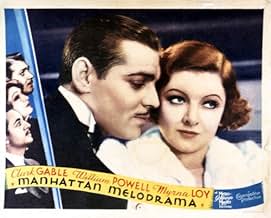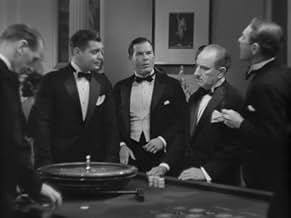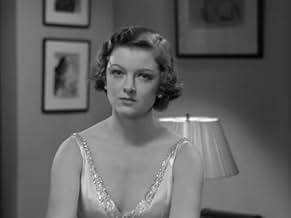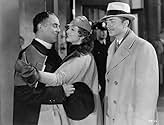IMDb रेटिंग
7.1/10
5.1 हज़ार
आपकी रेटिंग
अपनी भाषा में प्लॉट जोड़ेंThe friendship between two orphans endures even though they grow up on opposite sides of the law and fall in love with the same woman.The friendship between two orphans endures even though they grow up on opposite sides of the law and fall in love with the same woman.The friendship between two orphans endures even though they grow up on opposite sides of the law and fall in love with the same woman.
- 1 ऑस्कर जीते
- कुल 4 जीत
Thomas E. Jackson
- Richard Snow
- (as Thomas Jackson)
Isabelle Keith
- Miss Adams
- (as Claudelle Kaye)
Oscar Apfel
- Speaker of Assembly
- (बिना क्रेडिट के)
William Arnold
- Blackjack Dealer
- (बिना क्रेडिट के)
William Augustin
- Detective
- (बिना क्रेडिट के)
फ़ीचर्ड समीक्षाएं
Two boyhood friends (one played by a very young Mickey Rooney) grow up on opposite sides of the law. Clark Gable becomes a criminal--William Powell becomes governor. Myrna Loy loves both.
This plot is now screamingly familar but, back in 1934, this was original. In fact it won the Best Original Story Oscar for its year. This could have been a real howler but a great cast, tight script and wonderful direction really put it over. Well worth catching--especially for a powerful climatic scene between Powell and Gable. A classic of its type.
This plot is now screamingly familar but, back in 1934, this was original. In fact it won the Best Original Story Oscar for its year. This could have been a real howler but a great cast, tight script and wonderful direction really put it over. Well worth catching--especially for a powerful climatic scene between Powell and Gable. A classic of its type.
... those being "San Francisco" given the impact a disaster has on a community and the friendship as well as adversarial relationship the two male leads have to one another - with Gable being named "Blackie" in that one too, and the other being "The Thin Man" which reunites William Powell, Myrna Loy, and Nat Pendelton in a much better production that fires on all cylinders. Of course, both of these were directed by the director of this film, W. S. Van Dyke. That being said, this film doesn't seem nearly as good as it could have been.
The plot is this - Two friends grow up in the shadow of tragedy caused by sudden loss. The younger one is Blackie Gallagher (Clark Gable) and is always trying to work an angle - usually involving gambling - even before the tragedies. The older one is Jim Wade (William Powell) always studying, always chiding Blackie for his slacker and crooked ways, but always his friend. In adulthood, Blackie is a big time gambler and casino owner and is not adverse to murdering associates and Jim becomes district attorney in New York. And yet whenever they meet they seem fast friends. Eleanor (Myrna Loy) starts out Blackie's girl but decides she wants the conventional marriage she'll never get from Blackie and eventually marries Jim.. At this point I was starting to get bored with this morality tale until some of Blackie' s criminal acts cross paths with Jim's official duties where complications ensue.
There is just something off about this film. For one, Jim is supposed to be an uncorruptible political star destined for higher office but within the details of the film instead seems hopelessly naive and inflexible. Myrna Loy makes the transition from gangster moll to pious first lady in the blink of an eye, and even when she is with Blackie she is nagging him to "quit the rackets". Where did she think those marvelous evening gowns came from? There's just no way I'm believing Blackie is as ruthless in the rest of the film as he is shown to be and is just so "Oh gee whiz what class Jim has!" in response to things that impact his male pride (Eleanor), his livelihood, and even life itself. I guess none of this is as ridiculous as being expected to believe that Mickey Rooney grows up to be Clark Gable, but still the inconsistent characterizations are bothersome.
I'd say it is probably worthwhile overall and just to give it a pass as some of the weirdness may have been caused by confusion over just what exactly the production code, which began to be enforced two months after this was released, would allow.
The plot is this - Two friends grow up in the shadow of tragedy caused by sudden loss. The younger one is Blackie Gallagher (Clark Gable) and is always trying to work an angle - usually involving gambling - even before the tragedies. The older one is Jim Wade (William Powell) always studying, always chiding Blackie for his slacker and crooked ways, but always his friend. In adulthood, Blackie is a big time gambler and casino owner and is not adverse to murdering associates and Jim becomes district attorney in New York. And yet whenever they meet they seem fast friends. Eleanor (Myrna Loy) starts out Blackie's girl but decides she wants the conventional marriage she'll never get from Blackie and eventually marries Jim.. At this point I was starting to get bored with this morality tale until some of Blackie' s criminal acts cross paths with Jim's official duties where complications ensue.
There is just something off about this film. For one, Jim is supposed to be an uncorruptible political star destined for higher office but within the details of the film instead seems hopelessly naive and inflexible. Myrna Loy makes the transition from gangster moll to pious first lady in the blink of an eye, and even when she is with Blackie she is nagging him to "quit the rackets". Where did she think those marvelous evening gowns came from? There's just no way I'm believing Blackie is as ruthless in the rest of the film as he is shown to be and is just so "Oh gee whiz what class Jim has!" in response to things that impact his male pride (Eleanor), his livelihood, and even life itself. I guess none of this is as ridiculous as being expected to believe that Mickey Rooney grows up to be Clark Gable, but still the inconsistent characterizations are bothersome.
I'd say it is probably worthwhile overall and just to give it a pass as some of the weirdness may have been caused by confusion over just what exactly the production code, which began to be enforced two months after this was released, would allow.
They didn't name this "Manhatten *Melodrama* for nothing - it's classic melodrama! If you can get past the first fifteen minutes or so, what saves this film is the three leads: William Powell, Clark Gable, and Myrna Loy. As a Myrna Loy/William Powell fan, I love the whole scene from their first meeting, as she flings herself into his taxi, and he thinks she is out to wreck his career by pretending he assaulted her! Clark Gable is great as the charming bad guy, too. Of course, in this story about unpunished crime vs. betraying a friend, nobody ever considers the third way, but then it wouldn't be a melodrama anymore, would it? Anyway, if you enjoy golden oldies or any of the three main actors, it's worth watching.
From what I can gather, two main social factors led to the popularity of the gangster genre in the 1930s. The first, and most obvious, was the prevalence of criminals like Al Capone and John Dillinger, who were glorified by the national media. The second was the Great Depression, and how it impacted the traditional notion of the "American dream." Families – regardless of character or social standing – were torn apart amid the economic collapse, and no doubt many ordinary citizens contemplated crime as the route to happiness.
Films like 'Manhattan Melodrama (1934)' and 'Angels with Dirty Faces (1938)' place great emphasis on the thin line between "good" and "bad" characters, and often the central criminals are lamented as victims of circumstance. For example, James Cagney's Rocky Sullivan and Pat O'Brien's virtuous priest were separated by a matter of metres when the former is condemned to a life of crime. Circumstance, too, drives the fates of the characters in 'Manhattan Melodrama.' As children, both Jim Wade (William Powell) and Blackie Gallagher (Clark Gable) lose their parents in the burning of the steamship SS General Slocum, a true-life disaster caused by gross negligence that cost over 1000 lives. Each child responds to this injustice in their own way: Blackie rebels against the judicial system that betrayed him, whereas Jim enters law in a bid to reform it.
Whereas Warner Bros. was responsible for most of the decade's gangster films, 'Manhattan Melodrama' was produced by M-G-M, and helmed by W.S. Van Dyke (director of the first four 'Thin Man' films), whose decidedly non-gritty aesthetic style at first seems at odds with the required mood. However, it would be misleading to compare the film with the likes of 'Little Caesar (1931)' and 'Scarface (1932).' Firstly, Hollywood was now working, for the first time, under the active supervision of the Production Code Administration. Also, the studio's intentions for the film were undoubtedly geared towards a higher-brow audience, further suggested by the unintimidating, woman-friendly title.
Gable's "Blackie" Gallagher is not a paranoid hot-head like Tony Camonte or Rocky Sullivan, and, indeed, remains oddly passive throughout the film. When he does commit murders, it seems to be merely out of an obligation to genre conventions. Even when old friend Jim Wade dramatically demands his execution, Blackie looks on with a detached, amused smirk, doodling idly from the defendant's chair; the expected outburst of emotion never arrives. Instead, the story's central conflict unfolds entirely within the righteous Wade, who must choose between his personal and professional allegiances.
'Manhattan Melodrama' has achieved some notoriety for being the film that killed John Dillinger, so to speak. The fugitive bank-robber was gunned down by FBI agents as he emerged from a screening at Chicago's Biograph Theatre on July 22, 1934 (clips from the film were recently featured in Michael Mann's 'Public Enemies (2009)'). These curious circumstances can't help but make one ponder what Dillinger had thought of 'Manhattan Melodrama.' Had he, like Blackie, accepted that his time was coming to an end? Did he welcome death over a lifetime of legal persecution? At the very least, he checked out having experienced a very fine addition to the genre.
Films like 'Manhattan Melodrama (1934)' and 'Angels with Dirty Faces (1938)' place great emphasis on the thin line between "good" and "bad" characters, and often the central criminals are lamented as victims of circumstance. For example, James Cagney's Rocky Sullivan and Pat O'Brien's virtuous priest were separated by a matter of metres when the former is condemned to a life of crime. Circumstance, too, drives the fates of the characters in 'Manhattan Melodrama.' As children, both Jim Wade (William Powell) and Blackie Gallagher (Clark Gable) lose their parents in the burning of the steamship SS General Slocum, a true-life disaster caused by gross negligence that cost over 1000 lives. Each child responds to this injustice in their own way: Blackie rebels against the judicial system that betrayed him, whereas Jim enters law in a bid to reform it.
Whereas Warner Bros. was responsible for most of the decade's gangster films, 'Manhattan Melodrama' was produced by M-G-M, and helmed by W.S. Van Dyke (director of the first four 'Thin Man' films), whose decidedly non-gritty aesthetic style at first seems at odds with the required mood. However, it would be misleading to compare the film with the likes of 'Little Caesar (1931)' and 'Scarface (1932).' Firstly, Hollywood was now working, for the first time, under the active supervision of the Production Code Administration. Also, the studio's intentions for the film were undoubtedly geared towards a higher-brow audience, further suggested by the unintimidating, woman-friendly title.
Gable's "Blackie" Gallagher is not a paranoid hot-head like Tony Camonte or Rocky Sullivan, and, indeed, remains oddly passive throughout the film. When he does commit murders, it seems to be merely out of an obligation to genre conventions. Even when old friend Jim Wade dramatically demands his execution, Blackie looks on with a detached, amused smirk, doodling idly from the defendant's chair; the expected outburst of emotion never arrives. Instead, the story's central conflict unfolds entirely within the righteous Wade, who must choose between his personal and professional allegiances.
'Manhattan Melodrama' has achieved some notoriety for being the film that killed John Dillinger, so to speak. The fugitive bank-robber was gunned down by FBI agents as he emerged from a screening at Chicago's Biograph Theatre on July 22, 1934 (clips from the film were recently featured in Michael Mann's 'Public Enemies (2009)'). These curious circumstances can't help but make one ponder what Dillinger had thought of 'Manhattan Melodrama.' Had he, like Blackie, accepted that his time was coming to an end? Did he welcome death over a lifetime of legal persecution? At the very least, he checked out having experienced a very fine addition to the genre.
With a cast like this, how can you go wrong? And the film is a delight from beginning to end. Although all the players were great, special kudos to William Powell, whose uncompromising morals cause him to lose almost everything he has. His is a gut-wrenching performance, and the scene in which he addresses the assembly with tears in his eyes to tell of his own "weakness"--wow. It's rare to see Powell in a role with so much complexity and it is a marvelous performance.
क्या आपको पता है
- ट्रिवियाThe opening scenes depict the General Slocum disaster on the morning of June 15, 1904. The popular excursion steamer caught fire in New York's East River while transporting passengers to a picnic organized by St. Mark's Evangelical German Lutheran Church on the Lower East Side of Manhattan. With an estimated 1,021 fatalities, mostly women and children, this was New York City's single worst tragedy, in terms of lives lost, before 9/11. An incompetent, inexperienced crew was held primarily to blame for the tragedy.
- गूफ़In the cheering New York City crowds on Jim Wade's election night, supposedly in November 1925, theatre marquees are promoting 1933 films, including MGM's Dinner at Eight (1933) and Bombshell (1933) with Michael Strogoff (1910).
- भाव
Edward J. 'Blackie' Gallagher: Die the way you lived, all of a sudden, that's the way to go. Don't drag it out.
- इसके अलावा अन्य वर्जनAlso available in a computer colorized version.
- कनेक्शनFeatured in David O. Selznick: 'Your New Producer' (1935)
टॉप पसंद
रेटिंग देने के लिए साइन-इन करें और वैयक्तिकृत सुझावों के लिए वॉचलिस्ट करें
- How long is Manhattan Melodrama?Alexa द्वारा संचालित
विवरण
- रिलीज़ की तारीख़
- कंट्री ऑफ़ ओरिजिन
- भाषा
- इस रूप में भी जाना जाता है
- Three Men
- फ़िल्माने की जगहें
- उत्पादन कंपनियां
- IMDbPro पर और कंपनी क्रेडिट देखें
बॉक्स ऑफ़िस
- बजट
- $3,55,000(अनुमानित)
- चलने की अवधि1 घंटा 33 मिनट
- रंग
- पक्ष अनुपात
- 1.37 : 1
इस पेज में योगदान दें
किसी बदलाव का सुझाव दें या अनुपलब्ध कॉन्टेंट जोड़ें







































